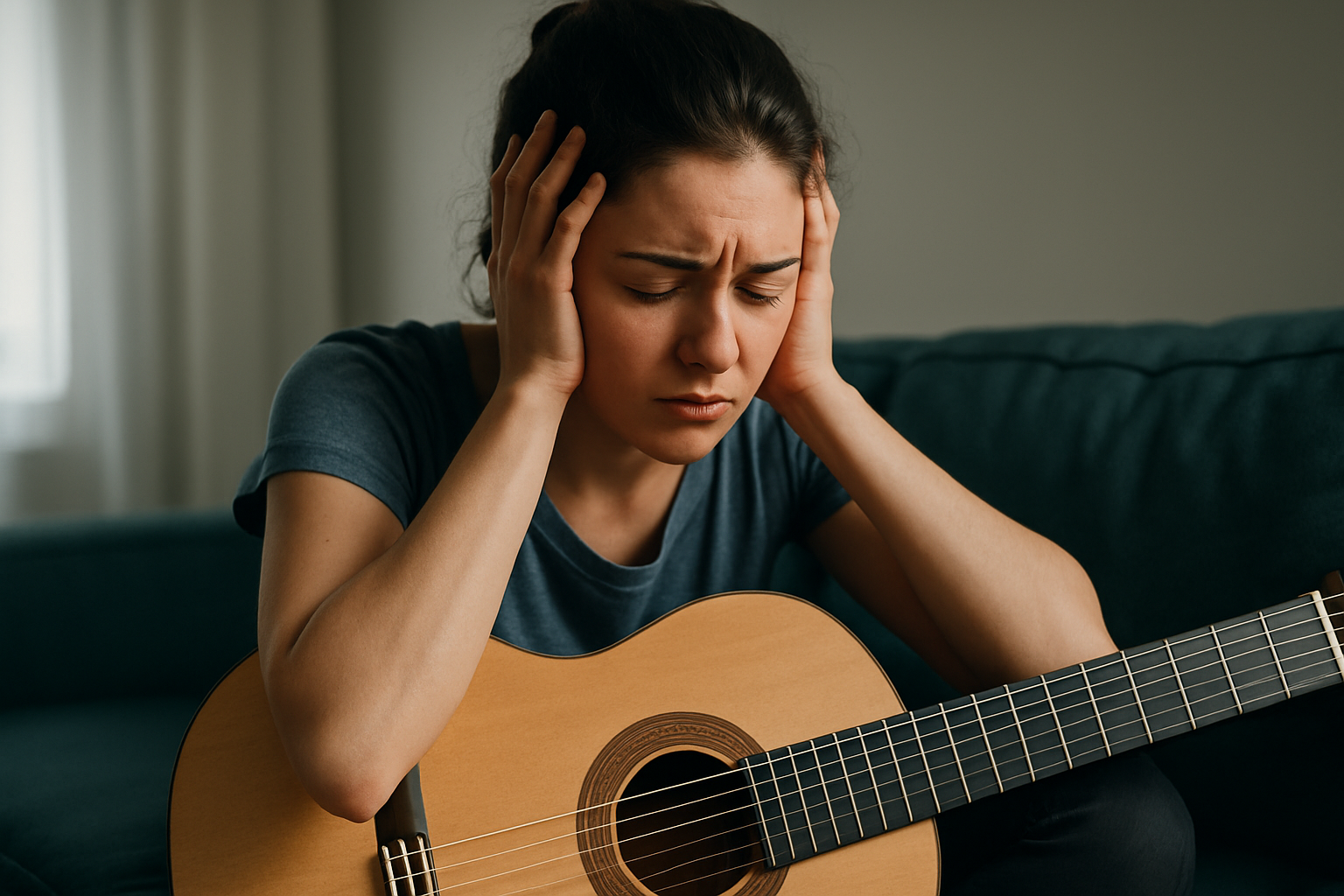Almost every musician, from beginners to professionals, has felt a racing heart, shaky hands, or self-doubt before playing. Anxiety in music is incredibly common. For some, it appears before a practice session—fearing mistakes or feeling overwhelmed by what they need to learn. For others, it strikes before performances, whether in front of one person or a full audience.
The good news is that anxiety does not mean you are unfit for music. In fact, it’s a natural response to wanting to do well. With the right strategies, you can learn to manage anxiety and even channel it into positive energy that enhances your playing.
In this article, we’ll explore why anxiety happens, how it affects music learning and performance, and practical ways to overcome it.
Why Musicians Experience Anxiety
1. Fear of Mistakes
Beginners often believe mistakes are failures. This creates pressure to be perfect, leading to nerves before playing.
2. Pressure to Perform
When others are listening, even casually, the desire to impress can trigger anxiety.
3. Physical Reactions
Adrenaline, released by the body in stressful situations, speeds up the heart and creates shaky hands—symptoms many musicians interpret as “bad.”
4. Overthinking
Analyzing every detail before playing can overwhelm the mind, making performance feel heavier than it is.
5. Lack of Preparation
Sometimes anxiety reflects reality—if you feel unprepared, nerves intensify.
How Anxiety Affects Practice and Performance
- Decreases focus: The mind worries instead of concentrating on the music.
- Affects coordination: Shaky hands or tense muscles disrupt technique.
- Reduces enjoyment: Fear replaces the joy of making music.
- Blocks progress: Avoiding practice due to anxiety slows development.
Recognizing these effects is the first step to addressing them.
Strategies to Overcome Anxiety Before Practice
1. Set Manageable Goals
Anxiety often comes from overwhelming expectations. Instead of “I must master this entire piece today,” try: “I will focus on the first four measures.” Smaller steps reduce pressure.
2. Create a Routine
Consistency builds comfort. If you always start with simple warm-ups, your brain associates practice with calmness.
3. Use Positive Self-Talk
Replace thoughts like “I’m terrible at this” with “I’m improving every day.” Words influence emotions.
4. Practice in Short Sessions
Break practice into 20–30 minute blocks. This prevents fatigue and mental overload.
5. Record Yourself
Listening back helps normalize mistakes and reduces the fear of being judged.
Strategies to Overcome Anxiety Before Performing
1. Breathe Deeply
Anxiety speeds up breathing. Diaphragmatic breathing calms the nervous system. Inhale for four counts, hold for four, exhale for six.
2. Visualize Success
Close your eyes and imagine playing confidently. Visualization builds mental rehearsal and reduces nerves.
3. Start Small
Perform for a friend or family member before larger audiences. Gradual exposure builds confidence.
4. Focus on the Music, Not the Audience
Shift attention away from people watching. Think about expressing the music rather than impressing others.
5. Accept Imperfection
Even professionals make mistakes. Audiences rarely notice small errors—what they remember is the emotion.
6. Prepare Thoroughly
The more prepared you are, the less room anxiety has to grow. Consistent, mindful practice makes you feel secure.
Techniques to Reduce Physical Symptoms
- Stretching: Loosens tense muscles.
- Progressive muscle relaxation: Tense and release body parts one by one.
- Grounding exercises: Focus on physical sensations, like feet on the floor, to stay present.
- Controlled breathing: Slows the heart rate and calms shakes.
Mental Shifts That Help With Anxiety
Reframe Anxiety as Excitement
The body’s reaction to stress—racing heart, energy rush—is similar to excitement. By telling yourself “I’m excited to play” instead of “I’m anxious,” you shift perception.
Focus on Expression, Not Perfection
Music is about communicating feelings, not flawless execution. Remind yourself why you love the piece and what you want to share.
Adopt a Growth Mindset
See mistakes as part of learning. Each performance is practice for the next.
Building Long-Term Resilience Against Anxiety
- Perform Regularly – The more you perform, the more natural it feels.
- Keep Perspective – One performance does not define your worth as a musician.
- Stay Physically Healthy – Sleep, nutrition, and exercise reduce overall anxiety.
- Practice Mindfulness – Meditation and breathing techniques build calm focus over time.
- Seek Support – Talking to teachers, peers, or even professionals normalizes the experience.
Stories of Musicians and Anxiety
- Barbara Streisand famously struggled with stage fright, showing that even world-class performers face it.
- Glenn Gould, one of the greatest pianists, preferred recording over live performance because of anxiety.
- Adele openly discusses nerves before shows, yet still delivers emotional, powerful performances.
These examples prove anxiety is not a weakness but a common part of the musician’s life.
Final Thoughts: Turning Anxiety Into Strength
Anxiety before practicing or performing does not mean you are failing—it means you care. The rush of adrenaline shows your body is preparing for something meaningful. By setting realistic goals, building healthy routines, and using practical techniques, you can transform anxiety into focus and energy.
Over time, nerves become less intimidating. Instead of fearing them, you learn to manage them. Instead of blocking your growth, they remind you that music is a passionate, human art.
So the next time your heart races before touching your instrument, remember: you are not alone. Breathe deeply, focus on the joy of sharing music, and trust that every performance—anxious or not—is a step toward becoming the musician you dream of being.
